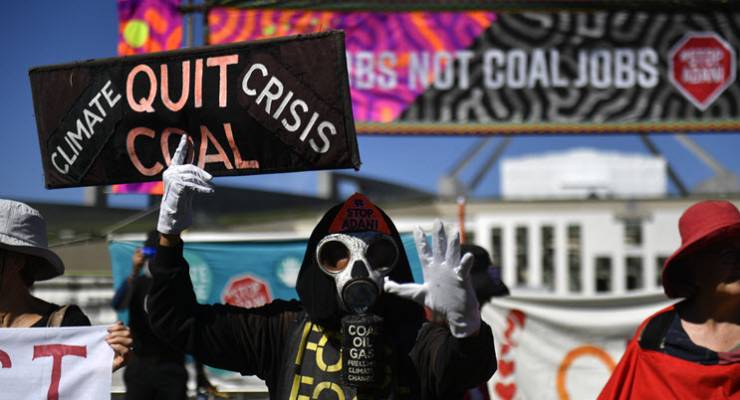
Politics is about choices. We elect leaders to make choices about war and peace, taxation and public expenditure, environmental protection and economic development. But, while we want our leaders to make choices, we punish them for making choices we don’t like. Unsurprisingly, politicians respond with creative use of ambiguity, giving different messages to different audiences, and trying to appear decisive without offending anybody.
Nowhere is this more true than in relation to climate change. When he was a believer in a market-based climate policy, Malcolm Turnbull accused Tony Abbott of being a “weathervane” on the issue, “first publicly advocating the blocking of the [emissions trading scheme], the passing of the ETS, the amending of the ETS and, if the amendments were satisfactory, passing it, and now the blocking of it”.
Since then, Turnbull’s position has undergone a remarkable range of gyrations, ending up in line with Abbott’s rejectionism on action to mitigate climate change.
Labor has faced many of the same problems in relation to the proposed development of coal mining in Queensland’s Galilee Basin. The immediate problems related to the Carmichael-Abbot Point mine-rail-port proposal put forward by the Adani Corporation, and the suggestion that the proposal should be supported by tax holidays and concessional loans.
The full development and extraction of the coal deposits in the Galilee Basin would be an environmental disaster, cancelling out all the efforts Australia has made to reduce carbon dioxide emissions. On the other hand, Adani has promised jobs in a region where they are in short supply, and royalties revenue to a government that is chronically short of cash.
These claims aren’t credible. The project, conceived at a time of booming demand for coal, is uneconomic at current and likely future prices. The declining fortunes of coal-fired power in India, with new coal now more expensive than solar photovoltaics, have rendered Adani’s “pit to plug” strategy unviable. The giant Mundra plan, the flagship of this strategy, has lost so much money that Adani has spun it off into a subsidiary, which it is now trying to divest.
Nevertheless, Adani has continued to push the proposal, perhaps because of unwillingness to write off the $3 billion or so invested to date. Claims of 10,000 jobs have been repeatedly debunked, but that does not stop them being repeated and believed.
At both state and federal levels, Labor has sought to walk a tightrope on the issue, arguing that the project should proceed if it is economically viable, while avoiding offering public financial support. The hope has been that the project would collapse due to the lack of any private sector investment before it was necessary to take a clear stand.
The Queensland state government pursued this strategy until it ran out of time in November last year. With a state election under way, it rapidly became obvious that support for Adani would cost Labor a lot of seats in south-eastern Queensland. Premier Annastacia Palaszczuk executed an inelegant backflip on the issue. Citing a supposed conflict of interest, she announced that the government would veto a concessional loan from the Northern Australia Infrastructure Facility to finance the construction of the rail component of the project. It remains unclear whether this veto extends to an alternative rail link being proposed by Aurizon.
Palaszczuk’s rationale for the decision convinced hardly anyone, but the electoral payoff was clear. Labor gained seats in south-east Queensland and staved off challenges from the Greens in seats like South Brisbane. Meanwhile, the party retained its seats in the cities of Townsville and Rockhampton, the proposed bases for the fly-in-fly-out workforce.
With the announcement of the Batman byelection, it is now federal Labor’s turn to make a choice. Opposition Leader Shorten has clearly signalled the withdrawal of support for the project. The only question is whether he will match the Green position of outright opposition.
More importantly, perhaps, Shorten has announced that, regardless of the outcome with Adani, Labor will announce a jobs package for north Queensland. There is ample evidence that the financial support sought by Adani and Aurizon could generate more jobs if it were allocated to more sustainable projects.
There is at least one positive outcome on offer here. With the LNP still firmly supporting the proposal, voters will be offered a clear choice on this issue rather than the ambiguous fudges we have seen in the past.








I think it is the case that Abbott admitted to being a “weathervane” on climate change; it wasn’t an accusation by Turnbull. He was proud of it.
It is beyond dispute that the worlds largest coal-plant developer is now in India. It is also beyond dispute that if Adani doesn’t get its coal from Australia, it will have to source it from another nation, so in terms of world carbon dioxide emissions it’s a zero sum game, no matter what conflated logic the Greens try to put forward on the issue.
I, like many others, have serious doubts about the number of jobs the project will create in Australia, but that’s a different argument altogether. In the end, it needs to be a decision for the voters of QLD, rather than the latte-swilling voters of Batman, and Shorten will understand clearly that the next federal election will be won in QLD and WA, and not Victoria.
Banks will not lend to Adani. Does he have a line of credit anywhere? Is he subject of criminal investigations? What about environmental history?